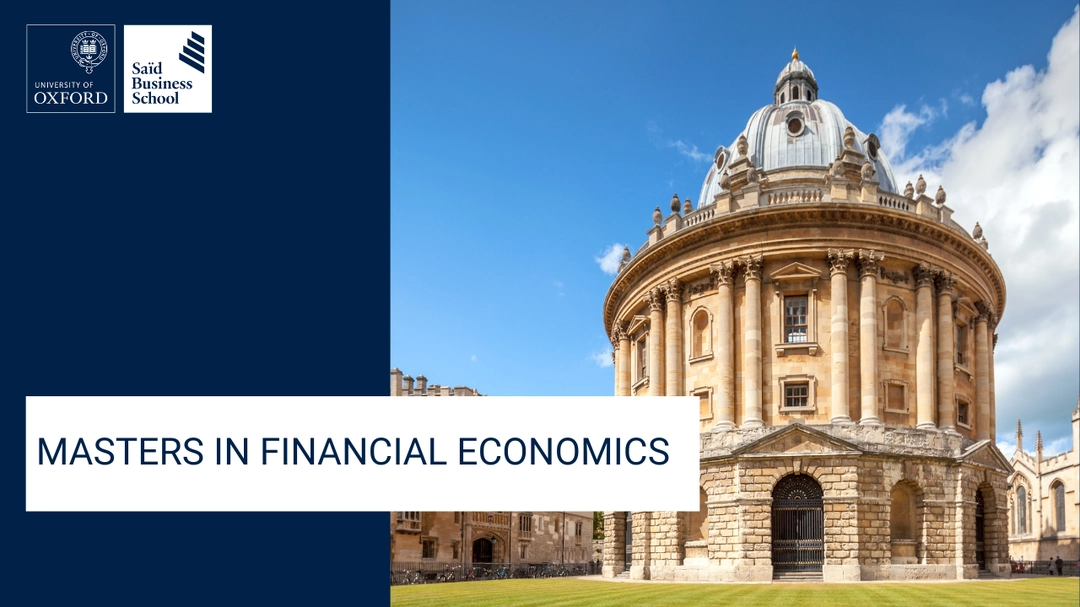
Top MEM Schools in USA: Why Everyone’s Talking About This Degree
What Is a MEM Degree and Why Is It So Popular?If you're a STEM graduate who wants to lead teams, manage projects, and s…
Table of Contents

Before diving into the details, here are the essential highlights of the Oxford MSc Financial Economics (MFE) program:
The Oxford MSc Financial Economics program is designed for ambitious students who seek to develop strong analytical, financial, and economic expertise, preparing them for top-tier roles in global finance, consulting, and policymaking.
The Oxford MSc Financial Economics (MFE) is a prestigious and highly selective program offered by the Saïd Business School at the University of Oxford. Designed in collaboration with Oxford’s Department of Economics, the MFE program blends financial theory, quantitative methods, and real-world applications to prepare graduates for high-impact careers in finance, consulting, and policymaking.
This 9-month, full-time program is ideal for students who want to gain advanced financial knowledge while benefiting from Oxford’s world-class faculty, global alumni network, and strong employer connections.
The Oxford MSc Financial Economics program stands out for its:
With its intensive curriculum, global reputation, and exceptional career outcomes, the Oxford MSc Financial Economics program is a top choice for students aiming to secure elite finance roles worldwide.

The Oxford MSc Financial Economics class is highly selective, attracting some of the best finance and economics talent from around the world. The program fosters a diverse and international learning environment, ensuring students benefit from a global network of future finance leaders.
The average work experience of students in the class is around 2-3 years. This means most students come with a solid foundation in the finance or economics field, giving them the ability to contribute valuable real-world perspectives to classroom discussions. The combination of academic excellence and professional experience makes the program particularly attractive to employers looking for well-rounded graduates.
Each cohort consists of 80-100 students, creating a collaborative and intellectually stimulating learning experience. The program is known for its:
Admission to the Oxford MSc Financial Economics program is extremely competitive, with a strong focus on quantitative and analytical skills.
Admission Criteria | Average Scores |
| GMAT Score | 700-750 |
| GRE Quantitative Score | 165+ |
| Undergraduate GPA | 3.7+ (on a 4.0 scale) |
| Work Experience | 0-2 years (internships highly recommended) |
While Oxford MSC financial economics average work experience is not mandatory, applicants with finance-related internships at top firms have a competitive advantage in the admissions process.
Graduates of the Oxford MSc Financial Economics program have gone on to high-profile careers in investment banking, consulting, asset management, fintech, and policymaking. Many alumni hold leadership positions at global financial firms, central banks, and government agencies.
Oxford MFE graduates have secured roles at top-tier financial institutions and global firms, including:
Many alumni also pursue doctoral studies at leading universities such as Harvard, Stanford, and London Business School, using their Oxford MFE experience as a launchpad for academic and research careers in financial economics.
Oxford’s strong employer connections, extensive alumni network, and global reputation ensure that graduates can secure top finance roles in highly competitive markets.
The Oxford MSc Financial Economics program is consistently ranked among the top finance and economics master's programs globally. Its rigorous curriculum, high job placement rates, and employer reputation make it a top choice for finance professionals.
Ranking Body | Rank |
| Financial Times (oxford of Masters in Finance – Pre-Experience) | Top 10 Globally |
| QS World University Rankings (Finance & Economics) | Top 5 in the UK |
| U.S. News & World Report (Global Universities – Economics & Business) | Top 10 Worldwide |
The Oxford MSc Financial Economics program continues to be recognized as one of the best finance master’s programs worldwide, offering students exceptional career prospects and a strong return on investment.
The Oxford MSc Financial Economics program is one of the most selective finance master’s programs in the world, attracting applicants with outstanding academic credentials, strong quantitative skills, and relevant finance experience.
The Oxford MSc Financial Economics acceptance rate is estimated to be around 10-15%, making it one of the most competitive programs in finance and economics. Successful applicants typically demonstrate:
Requirement | Typical Range |
| GPA | 3.7+ (on a 4.0 scale) |
| GMAT Score | 700-750 |
| GRE Quantitative Score | 165+ |
| Work Experience | 0-2 years (internships highly recommended) |
| English Proficiency (IELTS/TOEFL) | IELTS: 7.5+, TOEFL: 110+ |
The Oxford MSc Financial Economics admissions process follows a round-based system, with applications reviewed on a rolling basis. Early applications are strongly encouraged due to high competition and limited seats.
Application Round | Deadline | Recommended For |
| Round 1 | Early September | Strong candidates, best chance for scholarships |
| Round 2 | Late October | International applicants (visa processing) |
| Round 3 | Early January | Domestic & international applicants |
| Round 4 | Late March | Final deadline, limited availability |
The Oxford MSc Financial Economics admissions process is highly competitive and holistic, focusing on academic excellence, leadership potential, and career aspirations.

The Oxford MSc Financial Economics program offers a rigorous and highly analytical curriculum designed to provide students with advanced financial knowledge and quantitative skills. The program balances economic theory, corporate finance, asset pricing, and data-driven financial analysis, making graduates highly competitive in global financial markets.
The program begins with core courses that establish a strong foundation in financial economics, quantitative methods, and financial modeling.
Core Courses | Key Learning Outcomes |
| Asset Pricing | Understand financial markets, risk factors, and return models |
| Corporate Finance | Evaluate corporate investment decisions, capital structure, and firm valuation |
| Economics for Financial Analysis | Apply macro and microeconomic principles to financial decision-making |
| Financial Econometrics | Use statistical models, machine learning, and big data for financial predictions |
| Financial Markets & Institutions | Analyze the role of central banks, financial intermediaries, and regulations |
Students develop expertise in financial modeling, quantitative trading strategies, and risk management, essential for investment banking, asset management, and consulting careers.
In addition to core courses, students can choose from a range of electives to specialize in areas like fintech, private equity, and portfolio management.
Elective Courses | Specialization Focus |
| Private Equity & Venture Capital | Learn valuation techniques, deal structuring, and fundraising strategies |
| Algorithmic & High-Frequency Trading | Develop automated trading strategies using Python & quantitative finance models |
| Hedge Funds & Alternative Investments | Explore strategies in global macro, arbitrage, and distressed assets |
| Big Data & Machine Learning for Finance | Apply AI-driven financial analysis, risk modeling, and behavioral finance |
| International Finance & Policy | Study exchange rates, economic crises, and policy impacts on global finance |
The flexible curriculum allows students to tailor their learning experience to match their career goals in investment banking, asset management, fintech, or financial policymaking.
The Oxford MSc Financial Economics program is a significant investment, but its high job placement rates and salary potential provide a strong return on investment.
Expense | Estimated Cost |
| Tuition Fees | ~£54,000 |
| College Fees | ~£4,000 |
| Living Expenses (Housing, Food, etc.) | ~£18,000 |
| Books & Supplies | ~£1,500 |
| Health Insurance | ~£500 |
| Total Estimated Cost | ~£78,000 |
Oxford’s Saïd Business School provides a world-class finance education, making graduates highly sought-after by top-tier employers worldwide.
Oxford offers several scholarships and financial aid options for outstanding candidates.
Students can also apply for graduate assistantships, research fellowships, and private education loans to support their studies.
Applying early in Round 1 or Round 2 increases the chances of receiving a scholarship or financial aid package.
Graduates from the Oxford MSc Financial Economics program are highly sought after by global investment banks, hedge funds, consulting firms, and fintech startups.
Employment Metric | Statistic |
| Employment Rate (within 6 months) | 90%+ |
| Average Salary | £60,000 - £90,000 ($75,000 - $110,000) |
| Median Signing Bonus | £10,000 - £20,000 ($12,500 - $25,000) |
| Top Hiring Industries | Investment Banking, Asset Management, Consulting, Private Equity, FinTech |
Oxford Saïd Business School’s career services provide 1-on-1 coaching, resume workshops, and networking events to connect students with top employers.
Oxford MFE graduates work in leading financial institutions worldwide. Some of the top recruiters include:
Graduates secure roles such as investment banking analysts, portfolio managers, risk analysts, and financial consultants, positioning them for long-term success in global finance careers.
With its strong employer connections, global reputation, and intensive financial training, the Oxford MSc Financial Economics program ensures graduates are highly competitive in finance, consulting, and policymaking roles worldwide.
The Oxford MSc Financial Economics application process is highly competitive, requiring candidates to submit essays, recommendation letters, and attend an interview. The admissions committee looks for academic excellence, leadership potential, and strong quantitative skills.
Applicants must submit one or more essays that highlight their career goals, analytical abilities, and motivation for joining the program. Strong essays clearly define career aspirations and demonstrate a candidate’s ability to thrive in a rigorous finance-focused environment.
Typical essay topics include:
Expert Tips for a Strong Essay:
The second essay typically focuses on leadership experiences, teamwork, and analytical thinking.
Sample Prompts:
Key Writing Strategies:
Shortlisted candidates are invited for an interview with Oxford’s admissions committee. The interview assesses a candidate’s quantitative skills, financial knowledge, and leadership potential.

The Oxford MSc Financial Economics program stands out due to its global reputation, strong industry connections, and rigorous academic training.
With its elite reputation, strong employer ties, and data-driven financial training, the Oxford MSc Financial Economics program provides exceptional career outcomes for graduates.
For prospective applicants, the following resources provide valuable insights, application support, and career planning guidance for the Oxford MSc Financial Economics program.
For the latest updates on curriculum, admissions, deadlines, and career outcomes, visit the official program page.
The Oxford MSc Financial Economics program is an elite finance master’s degree that prepares students for top careers in investment banking, asset management, consulting, and fintech. With a prestigious global reputation, strong employer partnerships, and an intensive curriculum, Oxford MFE offers exceptional career growth opportunities.
As one of the most sought-after finance masters at Oxford, the program attracts highly talented candidates from around the world. The Oxford MSc Finance acceptance rate is highly competitive, reflecting the program's exclusivity and the high caliber of students it admits. With the reputation of Oxford and its strong focus on finance, the finance masters at Oxford open doors to lucrative roles across various sectors of the financial industry.
